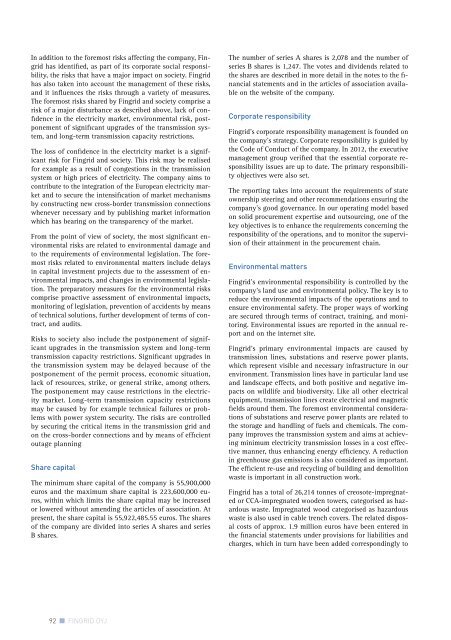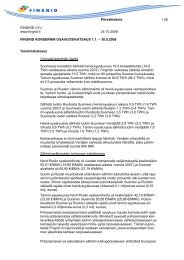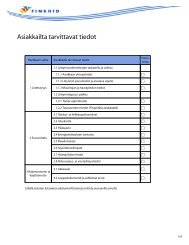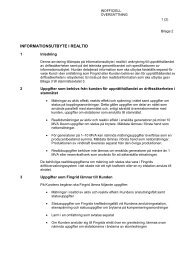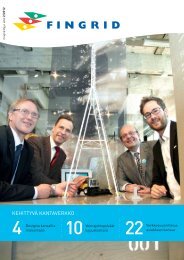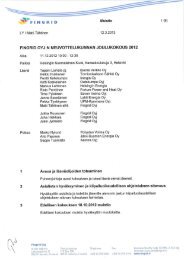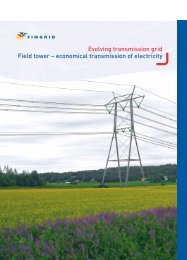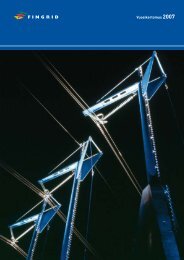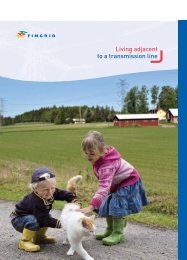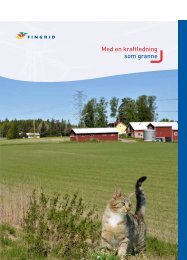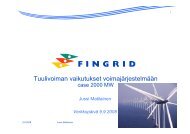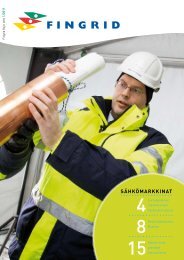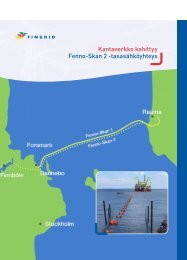Annual Report 2012 - Fingrid
Annual Report 2012 - Fingrid
Annual Report 2012 - Fingrid
Create successful ePaper yourself
Turn your PDF publications into a flip-book with our unique Google optimized e-Paper software.
In addition to the foremost risks affecting the company, <strong>Fingrid</strong><br />
has identified, as part of its corporate social responsibility,<br />
the risks that have a major impact on society. <strong>Fingrid</strong><br />
has also taken into account the management of these risks,<br />
and it influences the risks through a variety of measures.<br />
The foremost risks shared by <strong>Fingrid</strong> and society comprise a<br />
risk of a major disturbance as described above, lack of confidence<br />
in the electricity market, environmental risk, postponement<br />
of significant upgrades of the transmission system,<br />
and long-term transmission capacity restrictions.<br />
The loss of confidence in the electricity market is a significant<br />
risk for <strong>Fingrid</strong> and society. This risk may be realised<br />
for example as a result of congestions in the transmission<br />
system or high prices of electricity. The company aims to<br />
contribute to the integration of the European electricity market<br />
and to secure the intensification of market mechanisms<br />
by constructing new cross-border transmission connections<br />
whenever necessary and by publishing market information<br />
which has bearing on the transparency of the market.<br />
From the point of view of society, the most significant environmental<br />
risks are related to environmental damage and<br />
to the requirements of environmental legislation. The foremost<br />
risks related to environmental matters include delays<br />
in capital investment projects due to the assessment of environmental<br />
impacts, and changes in environmental legislation.<br />
The preparatory measures for the environmental risks<br />
comprise proactive assessment of environmental impacts,<br />
monitoring of legislation, prevention of accidents by means<br />
of technical solutions, further development of terms of contract,<br />
and audits.<br />
Risks to society also include the postponement of significant<br />
upgrades in the transmission system and long-term<br />
transmission capacity restrictions. Significant upgrades in<br />
the transmission system may be delayed because of the<br />
postponement of the permit process, economic situation,<br />
lack of resources, strike, or general strike, among others.<br />
The postponement may cause restrictions in the electricity<br />
market. Long-term transmission capacity restrictions<br />
may be caused by for example technical failures or problems<br />
with power system security. The risks are controlled<br />
by securing the critical items in the transmission grid and<br />
on the cross-border connections and by means of efficient<br />
outage planning<br />
Share capital<br />
The minimum share capital of the company is 55,900,000<br />
euros and the maximum share capital is 223,600,000 euros,<br />
within which limits the share capital may be increased<br />
or lowered without amending the articles of association. At<br />
present, the share capital is 55,922,485.55 euros. The shares<br />
of the company are divided into series A shares and series<br />
B shares.<br />
The number of series A shares is 2,078 and the number of<br />
series B shares is 1,247. The votes and dividends related to<br />
the shares are described in more detail in the notes to the financial<br />
statements and in the articles of association available<br />
on the website of the company.<br />
Corporate responsibility<br />
<strong>Fingrid</strong>’s corporate responsibility management is founded on<br />
the company’s strategy. Corporate responsibility is guided by<br />
the Code of Conduct of the company. In <strong>2012</strong>, the executive<br />
management group verified that the essential corporate responsibility<br />
issues are up to date. The primary responsibility<br />
objectives were also set.<br />
The reporting takes into account the requirements of state<br />
ownership steering and other recommendations ensuring the<br />
company’s good governance. In our operating model based<br />
on solid procurement expertise and outsourcing, one of the<br />
key objectives is to enhance the requirements concerning the<br />
responsibility of the operations, and to monitor the supervision<br />
of their attainment in the procurement chain.<br />
Environmental matters<br />
<strong>Fingrid</strong>’s environmental responsibility is controlled by the<br />
company’s land use and environmental policy. The key is to<br />
reduce the environmental impacts of the operations and to<br />
ensure environmental safety. The proper ways of working<br />
are secured through terms of contract, training, and monitoring.<br />
Environmental issues are reported in the annual report<br />
and on the internet site.<br />
<strong>Fingrid</strong>’s primary environmental impacts are caused by<br />
transmission lines, substations and reserve power plants,<br />
which represent visible and necessary infrastructure in our<br />
environment. Transmission lines have in particular land use<br />
and landscape effects, and both positive and negative impacts<br />
on wildlife and biodiversity. Like all other electrical<br />
equipment, transmission lines create electrical and magnetic<br />
fields around them. The foremost environmental considerations<br />
of substations and reserve power plants are related to<br />
the storage and handling of fuels and chemicals. The company<br />
improves the transmission system and aims at achieving<br />
minimum electricity transmission losses in a cost effective<br />
manner, thus enhancing energy efficiency. A reduction<br />
in greenhouse gas emissions is also considered as important.<br />
The efficient re-use and recycling of building and demolition<br />
waste is important in all construction work.<br />
<strong>Fingrid</strong> has a total of 26,214 tonnes of creosote-impregnated<br />
or CCA-impregnated wooden towers, categorised as hazardous<br />
waste. Impregnated wood categorised as hazardous<br />
waste is also used in cable trench covers. The related disposal<br />
costs of approx. 1.9 million euros have been entered in<br />
the financial statements under provisions for liabilities and<br />
charges, which in turn have been added correspondingly to<br />
92 FINGRID OYJ


